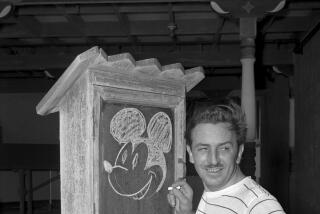Bernard Loomis, 82; Turned Ads for Toys Into TV Cartoons
- Share via
Bernard Loomis, an influential toy marketer who, by turning advertisements for toys into children’s cartoon programming, was dubbed “the man who invented Saturday morning,” died of heart disease June 2 at his home in Palm Beach Gardens, Fla. He was 82.
In the volatile world of toy sales, Loomis had a remarkable record of marketing bestselling toys from the late 1950s to the 1990s.
He introduced the Hot Wheels action cars as characters in a television show. When the first “Star Wars” movie became a surprise hit, he sold empty boxes during the Christmas season with the promise to deliver the toys later, in effect creating a futures market for toys.
“He has been associated with the largest toy company in the world, at the moment it became the largest toy company, on three separate occasions,” David Owen wrote in Atlantic monthly in 1986. “Almost every time the industry has taken a major, controversial step in the past 25 years, Loomis has been in the neighborhood.”
He conceived of the Strawberry Shortcakes as dolls, greeting cards and a made-for-TV movie. He licensed and sold action figures that included the Six Million Dollar Man, the Bionic Woman and Baby Alive, which when fed a special formula required a diaper change. He was astonished when colleagues thought Baby Alive would not sell, and he rejected requests to conduct time-consuming market research.
“The trouble with research is it tells you what people were thinking about yesterday, not tomorrow. It’s like driving a car using a rearview mirror,” he once said.
Loomis, who had a highly animated demeanor, loved to play. His desk was covered with action figures. He also made a habit of watching Saturday morning television, although his children didn’t, said one of his daughters, Merrill Nan Loomis.
Born into poverty in the Bronx, N.Y., Loomis had no toys as a child, but he created a baseball game out of a deck of cards and memorized the Lionel train catalog.
He served with the Army Air Forces in the Philippines during World War II, then returned to New York and attended New York University. During the 1950s, he worked at a hardware store and then as a salesman for a toy maker before he joined Mattel when it was still small.
“Prior to Mattel, there were no branded toys,” Loomis told Robert Spector, author of “Category Killers: The Retail Revolution and Its Impact on Consumer Culture.” “The business at that point was oriented to a few major retailers, like Sears. Sears buyers ran the world.”
When Mattel began advertising on television, the retailers’ power was broken. TV expanded the market for toys, which resulted in lower prices for shoppers and narrower profit margins.
In 1969, Mattel was ready to introduce a matchbox-size series of miniature cars called Hot Wheels. Instead of simply making commercials, Loomis proposed creating a 30-minute program about the toys to appear on Saturday morning television. Although other toys had been spun off successful TV shows, no one had ever started a children’s show with such a blatant commercial purpose.
The Federal Communications Commission, prodded by a Mattel competitor, asked stations to log the show as advertising time, which temporarily ruined the idea for other projects. The concept of commercials as entertainment programs returned about a decade later, when the federal regulatory climate had changed.
Loomis had already moved on to General Mills, where he was president of Kenner Toys. He turned down the chance to license Steven Spielberg’s new movie, “Close Encounters of the Third Kind,” considering it not “toyetic,” meaning that its characters would not make good toys.
But he spotted a small notice for a movie called “Star Wars” in a Hollywood trade magazine that sounded more likely: Its characters wore distinctive costumes.
In keeping with standard practice, the “Star Wars” toys were not supposed to appear until about a year after the movie opened. But the immediate success of the film prompted Loomis to reconsider.
Unable to speed up production, and with the all-important Christmas season nearing, Loomis ordered paper certificates sold in colorful boxes for the price of the toy. Kenner promised to deliver the toys by mail eight months later, and then a second wave of demand crested, as youngsters competed to get what their friends had.
With Loomis at the helm, General Mills’ toy group surpassed Mattel as the world’s largest and most profitable toy company. By 1984, he started a joint venture with Hasbro and served as consultant to that firm as it rose to the top of the industry.
He operated his own business consulting group starting in 1988 and with his daughter Merrill launched another successful series, Quints dolls and accessories, with Tyco.
Loomis was the man behind the title of David Owen’s “The Man Who Invented Saturday Morning, and Other Adventures in American Enterprise.”
In addition to his daughter Merrill of Napa, Calif., survivors include his wife of 59 years, Lillian Prince Loomis, of Palm Beach Gardens; another daughter, Debra Jan Loomis of Middletown, Calif.; and two grandchildren.
More to Read
Inside the business of entertainment
The Wide Shot brings you news, analysis and insights on everything from streaming wars to production — and what it all means for the future.
You may occasionally receive promotional content from the Los Angeles Times.










